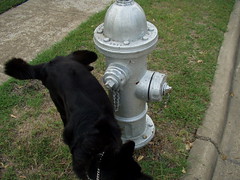So, 800-pound Microsoft has begun developing a network of Innovation Centers around the globe as part of strategy to "to foster innovation and growth in local software economies." Hmmm....
I think most people would be at least a little suspicious of Microsoft's intentions in spearheading such an effort. Innovation is inherently a collaborative and not a competitive process. Microsoft claims to be cooperating with governments, universities, and other software companies; while I see no reason to think that they're not doing so, I do believe there are grounds for thinking that Microsoft may understand "cooperation" differently than some of its Innovation Center partners. Microsoft Founder Mr. Gates may or may not have reconnected with his inner philanthropist; it remains the case that Microsoft's behavior and corporate culture during his tenure was profoundly combative and territorial.
Soon every innovation in this neighborhood... will be mine!
(Photo by oddthingies)
A key question private businesses are asking themselves these days is how to capture value generated by an innovation process--how keep the innovation bird happy in its cage, as it were. Innovation, however, doesn't just thrive in an open environment--it arguably cannot even survive unless it can roam freely, build doors in impenetrable walls, outgrow its origins. While people can own innovation processes and products in the looser sense of taking responsibility for them, it's hard to see how anyone can own them in the stricter legal sense. (And I seriously, seriously doubt that Microsoft will be the one to crack this nut; their outlook is too closed.)
And if you've been wondering whether or not the new fixation on innovation is just a passing fad, it isn't. My ex-boss David Smith of the Affordable Housing Institute recently blogged about an April 2007 PNAS paper by Luís M. A. Bettencourt, et al., entitled "Growth, innovation, scaling, and the pace of life in cities." According to Smith, Bettencourt et al. divide all the factors of urban life into three categories:
- Factors that scale linearly with the city's size, such as number of jobs, water consumption, etc. (Smith calls these "personal matters");
- Factors that scale sublinearly with the city's size--i.e., those factors that enjoy economies of scale--such as consumption of energy and transportation resources (Smith calls these "hardware");
- those factors that scale superlinearly with the city's scale--i.e., those factors which enjoy network effects--such as disease rates, innovation rates, and wealth generation (Smith calls these "software," or "social interactions").
As anyone who's tried to innovate knows, innovation relies upon creativity, and creativity thrives in open systems, open networks, and open minds. It's no wonder that the interests in innovation and social entrepreneurship have developed in parallel, since social entrepreneurs seem willing to perform all kinds of commercial functions without basing their organizations on the pathological greed and egomania which lie at the heart of corporate misbehavior. Greed and egomania are diametrically opposed to the values of generosity and humility which form the basis of every successful culture of innovation.
Corporations today--and Microsoft is no exception--want the wealth that follows on the heels of good innovation, but they can't bring themselves to believe that "proprietary innovation" makes about as much sense as "a happily caged falcon." At bottom, I think it's our whole notion of ownership which needs rethinking. In a sense, after all, wealth belongs to communities (or societies, if you prefer). We just entrust it to corporations and families and individuals in the belief that they will use it responsibly if their personal well-being depends upon its sound management. A pretty smart system, overall. But can we imagine (and design) a better one? Can we imagine (and design) a form of ownership which engenders and protects responsibility, but also resists the excesses of the miser and the tyrant?

Maybe building a better cage means not building a cage at all; maybe it means becoming falconers.
(Photo by wallyg)
0 comments:
Post a Comment